Examining Legal and Ethical Issues in Nursing: A Case Study
VerifiedAdded on 2021/11/12
|6
|1423
|48
Case Study
AI Summary
This case study examines the ethical and legal issues arising from a situation where a witness, Tom, observes nursing aides mistreating dementia patients. The analysis identifies violations of ethical principles such as non-maleficence, beneficence, veracity, and fidelity. It discusses the legal implications under the Vulnerable Adult’s Act and the Singapore Nursing and Midwifery Board's ethical standards. The study emphasizes the importance of adhering to ethical guidelines, advocating for patient rights, and creating a safe environment to maintain the integrity of the nursing profession. The case underscores the need for healthcare professionals to report misconduct and prioritize patient-centered care, ensuring the well-being of vulnerable individuals.
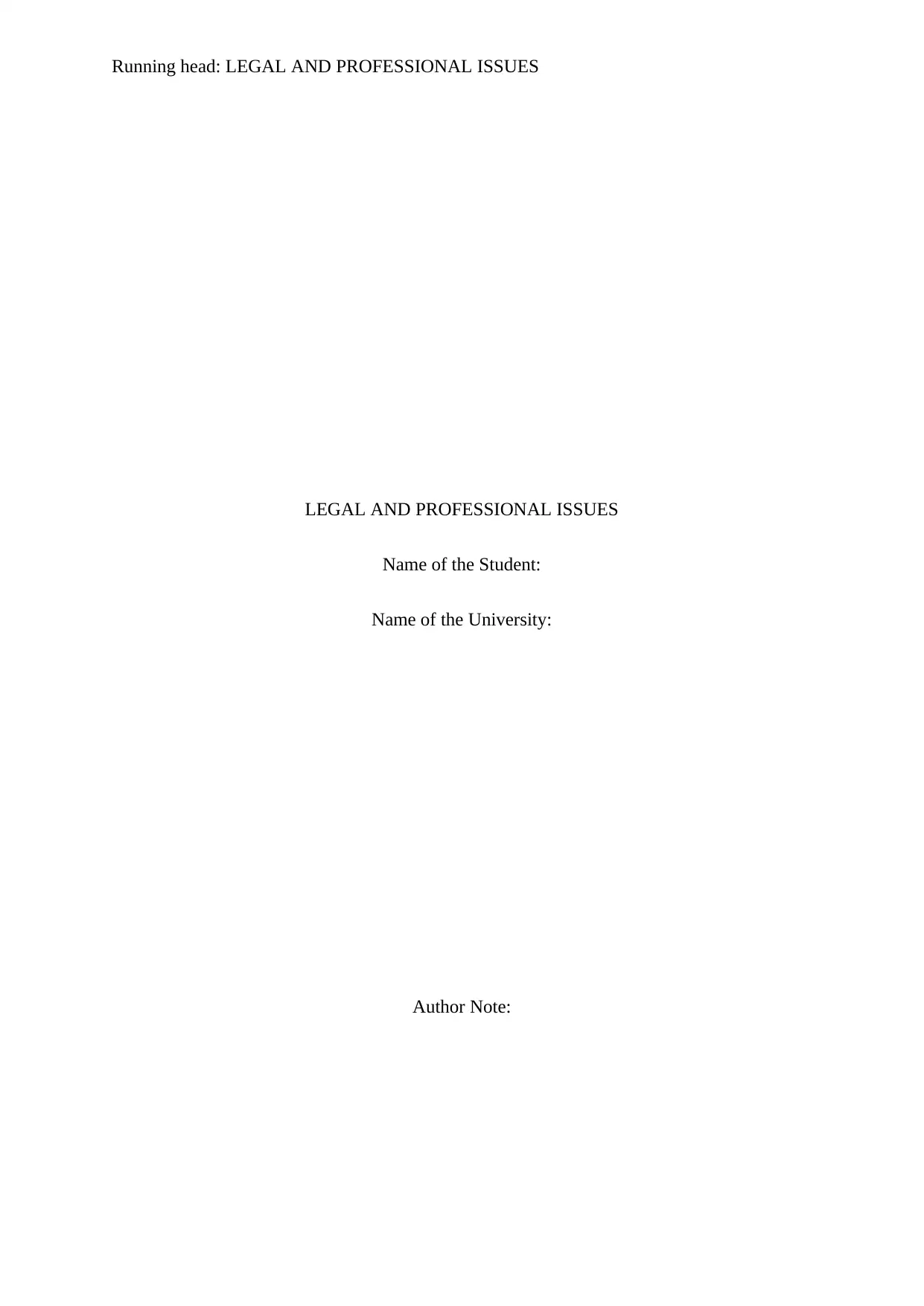
Running head: LEGAL AND PROFESSIONAL ISSUES
LEGAL AND PROFESSIONAL ISSUES
Name of the Student:
Name of the University:
Author Note:
LEGAL AND PROFESSIONAL ISSUES
Name of the Student:
Name of the University:
Author Note:
Paraphrase This Document
Need a fresh take? Get an instant paraphrase of this document with our AI Paraphraser
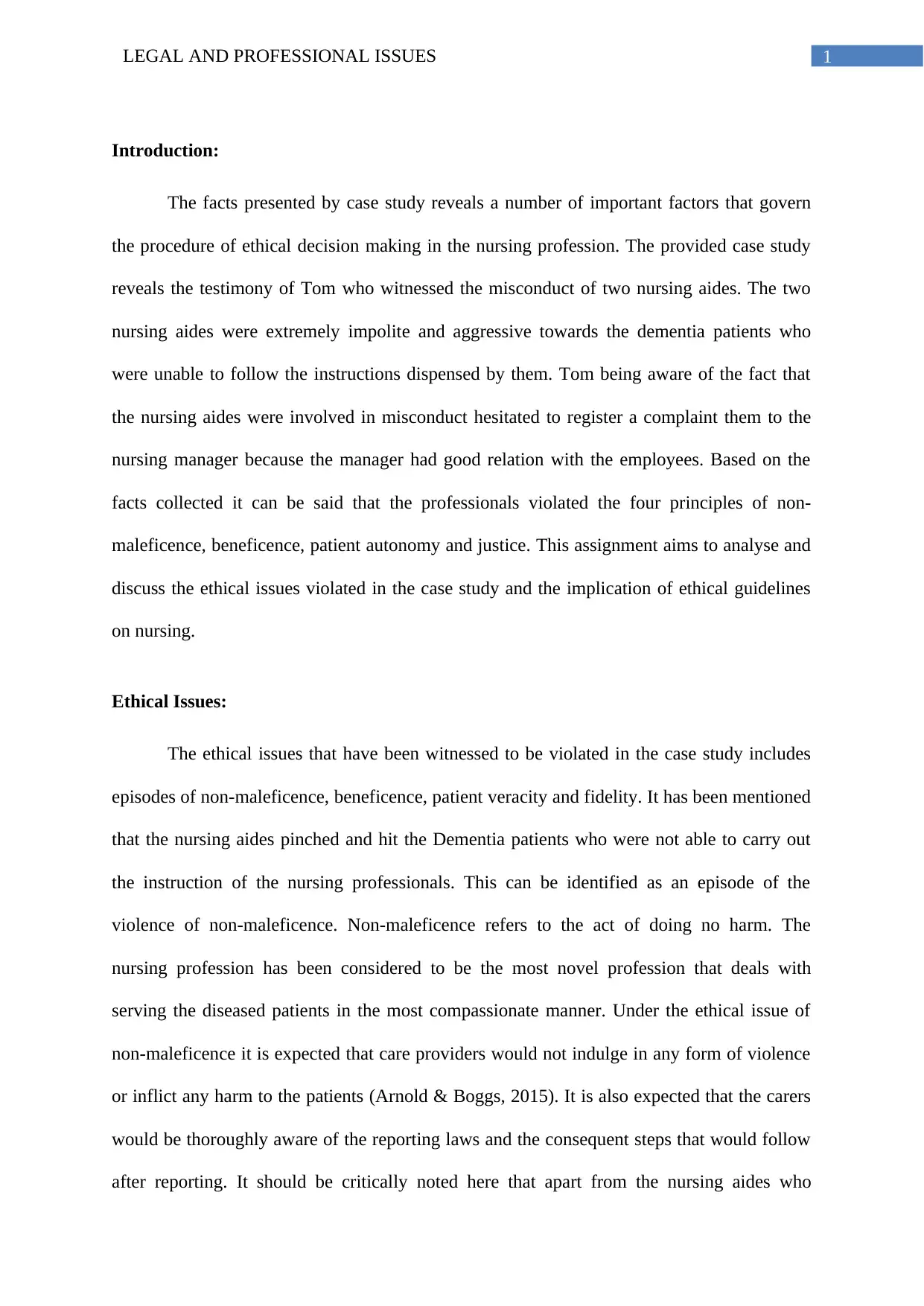
1LEGAL AND PROFESSIONAL ISSUES
Introduction:
The facts presented by case study reveals a number of important factors that govern
the procedure of ethical decision making in the nursing profession. The provided case study
reveals the testimony of Tom who witnessed the misconduct of two nursing aides. The two
nursing aides were extremely impolite and aggressive towards the dementia patients who
were unable to follow the instructions dispensed by them. Tom being aware of the fact that
the nursing aides were involved in misconduct hesitated to register a complaint them to the
nursing manager because the manager had good relation with the employees. Based on the
facts collected it can be said that the professionals violated the four principles of non-
maleficence, beneficence, patient autonomy and justice. This assignment aims to analyse and
discuss the ethical issues violated in the case study and the implication of ethical guidelines
on nursing.
Ethical Issues:
The ethical issues that have been witnessed to be violated in the case study includes
episodes of non-maleficence, beneficence, patient veracity and fidelity. It has been mentioned
that the nursing aides pinched and hit the Dementia patients who were not able to carry out
the instruction of the nursing professionals. This can be identified as an episode of the
violence of non-maleficence. Non-maleficence refers to the act of doing no harm. The
nursing profession has been considered to be the most novel profession that deals with
serving the diseased patients in the most compassionate manner. Under the ethical issue of
non-maleficence it is expected that care providers would not indulge in any form of violence
or inflict any harm to the patients (Arnold & Boggs, 2015). It is also expected that the carers
would be thoroughly aware of the reporting laws and the consequent steps that would follow
after reporting. It should be critically noted here that apart from the nursing aides who
Introduction:
The facts presented by case study reveals a number of important factors that govern
the procedure of ethical decision making in the nursing profession. The provided case study
reveals the testimony of Tom who witnessed the misconduct of two nursing aides. The two
nursing aides were extremely impolite and aggressive towards the dementia patients who
were unable to follow the instructions dispensed by them. Tom being aware of the fact that
the nursing aides were involved in misconduct hesitated to register a complaint them to the
nursing manager because the manager had good relation with the employees. Based on the
facts collected it can be said that the professionals violated the four principles of non-
maleficence, beneficence, patient autonomy and justice. This assignment aims to analyse and
discuss the ethical issues violated in the case study and the implication of ethical guidelines
on nursing.
Ethical Issues:
The ethical issues that have been witnessed to be violated in the case study includes
episodes of non-maleficence, beneficence, patient veracity and fidelity. It has been mentioned
that the nursing aides pinched and hit the Dementia patients who were not able to carry out
the instruction of the nursing professionals. This can be identified as an episode of the
violence of non-maleficence. Non-maleficence refers to the act of doing no harm. The
nursing profession has been considered to be the most novel profession that deals with
serving the diseased patients in the most compassionate manner. Under the ethical issue of
non-maleficence it is expected that care providers would not indulge in any form of violence
or inflict any harm to the patients (Arnold & Boggs, 2015). It is also expected that the carers
would be thoroughly aware of the reporting laws and the consequent steps that would follow
after reporting. It should be critically noted here that apart from the nursing aides who
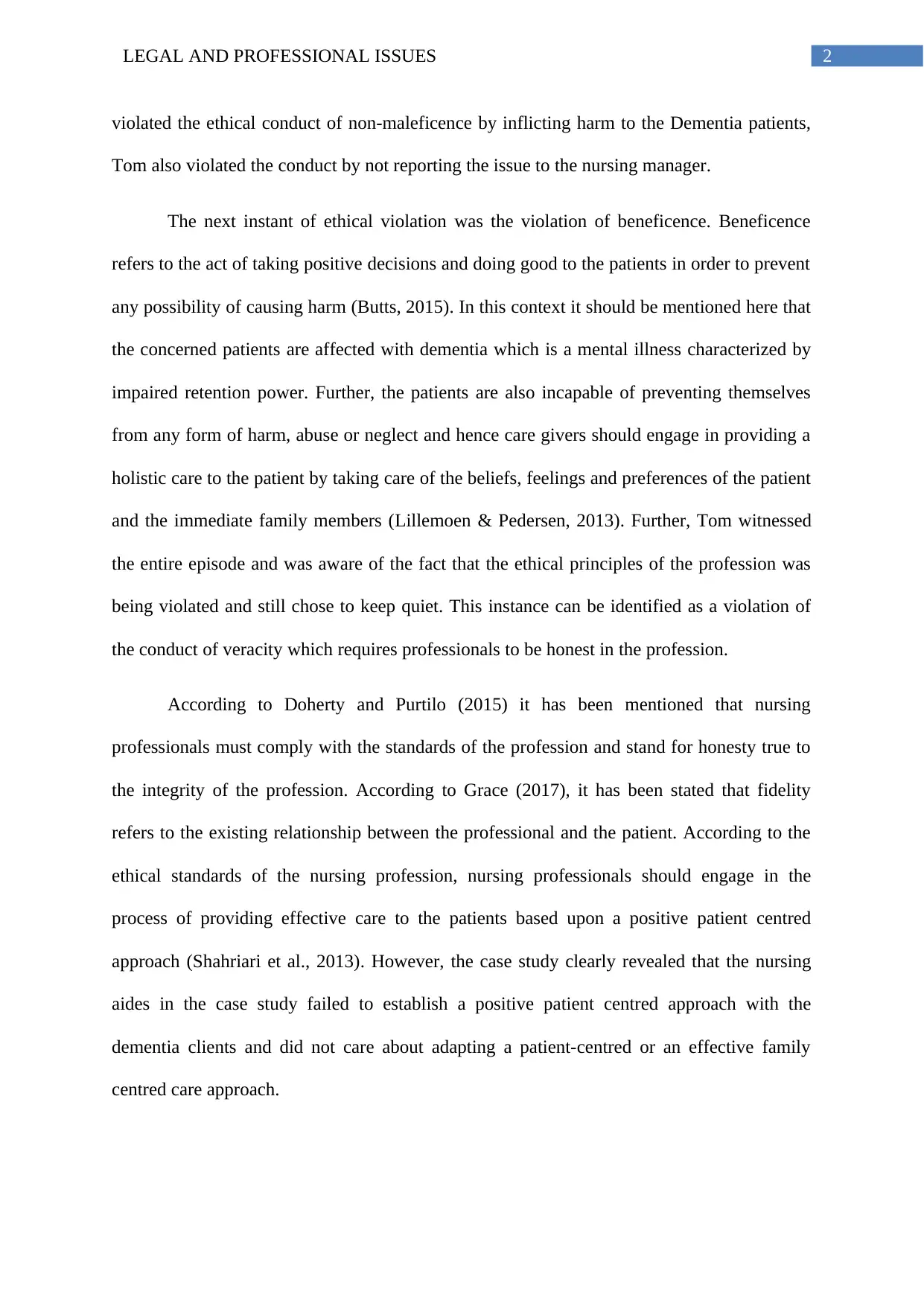
2LEGAL AND PROFESSIONAL ISSUES
violated the ethical conduct of non-maleficence by inflicting harm to the Dementia patients,
Tom also violated the conduct by not reporting the issue to the nursing manager.
The next instant of ethical violation was the violation of beneficence. Beneficence
refers to the act of taking positive decisions and doing good to the patients in order to prevent
any possibility of causing harm (Butts, 2015). In this context it should be mentioned here that
the concerned patients are affected with dementia which is a mental illness characterized by
impaired retention power. Further, the patients are also incapable of preventing themselves
from any form of harm, abuse or neglect and hence care givers should engage in providing a
holistic care to the patient by taking care of the beliefs, feelings and preferences of the patient
and the immediate family members (Lillemoen & Pedersen, 2013). Further, Tom witnessed
the entire episode and was aware of the fact that the ethical principles of the profession was
being violated and still chose to keep quiet. This instance can be identified as a violation of
the conduct of veracity which requires professionals to be honest in the profession.
According to Doherty and Purtilo (2015) it has been mentioned that nursing
professionals must comply with the standards of the profession and stand for honesty true to
the integrity of the profession. According to Grace (2017), it has been stated that fidelity
refers to the existing relationship between the professional and the patient. According to the
ethical standards of the nursing profession, nursing professionals should engage in the
process of providing effective care to the patients based upon a positive patient centred
approach (Shahriari et al., 2013). However, the case study clearly revealed that the nursing
aides in the case study failed to establish a positive patient centred approach with the
dementia clients and did not care about adapting a patient-centred or an effective family
centred care approach.
violated the ethical conduct of non-maleficence by inflicting harm to the Dementia patients,
Tom also violated the conduct by not reporting the issue to the nursing manager.
The next instant of ethical violation was the violation of beneficence. Beneficence
refers to the act of taking positive decisions and doing good to the patients in order to prevent
any possibility of causing harm (Butts, 2015). In this context it should be mentioned here that
the concerned patients are affected with dementia which is a mental illness characterized by
impaired retention power. Further, the patients are also incapable of preventing themselves
from any form of harm, abuse or neglect and hence care givers should engage in providing a
holistic care to the patient by taking care of the beliefs, feelings and preferences of the patient
and the immediate family members (Lillemoen & Pedersen, 2013). Further, Tom witnessed
the entire episode and was aware of the fact that the ethical principles of the profession was
being violated and still chose to keep quiet. This instance can be identified as a violation of
the conduct of veracity which requires professionals to be honest in the profession.
According to Doherty and Purtilo (2015) it has been mentioned that nursing
professionals must comply with the standards of the profession and stand for honesty true to
the integrity of the profession. According to Grace (2017), it has been stated that fidelity
refers to the existing relationship between the professional and the patient. According to the
ethical standards of the nursing profession, nursing professionals should engage in the
process of providing effective care to the patients based upon a positive patient centred
approach (Shahriari et al., 2013). However, the case study clearly revealed that the nursing
aides in the case study failed to establish a positive patient centred approach with the
dementia clients and did not care about adapting a patient-centred or an effective family
centred care approach.
⊘ This is a preview!⊘
Do you want full access?
Subscribe today to unlock all pages.

Trusted by 1+ million students worldwide
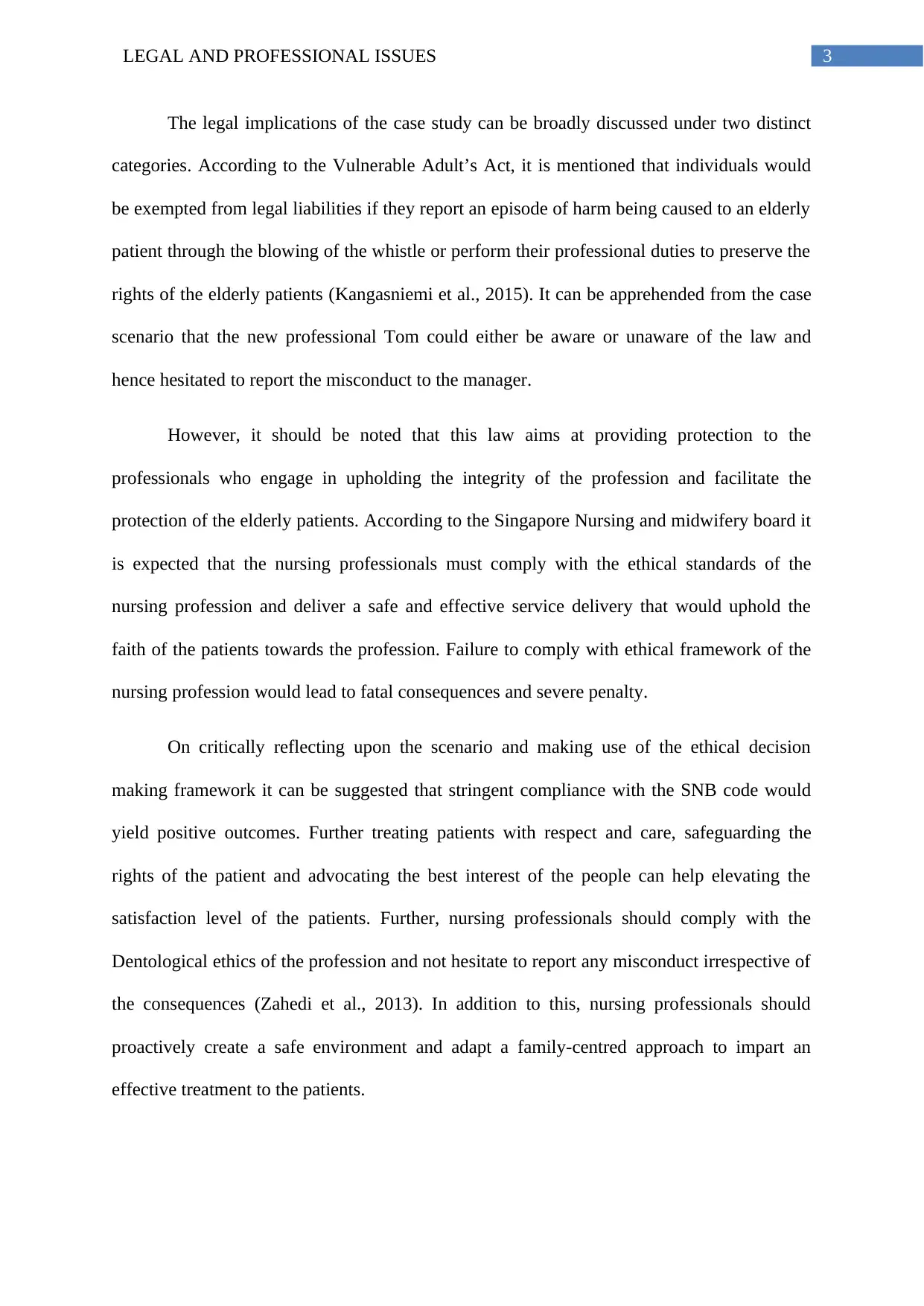
3LEGAL AND PROFESSIONAL ISSUES
The legal implications of the case study can be broadly discussed under two distinct
categories. According to the Vulnerable Adult’s Act, it is mentioned that individuals would
be exempted from legal liabilities if they report an episode of harm being caused to an elderly
patient through the blowing of the whistle or perform their professional duties to preserve the
rights of the elderly patients (Kangasniemi et al., 2015). It can be apprehended from the case
scenario that the new professional Tom could either be aware or unaware of the law and
hence hesitated to report the misconduct to the manager.
However, it should be noted that this law aims at providing protection to the
professionals who engage in upholding the integrity of the profession and facilitate the
protection of the elderly patients. According to the Singapore Nursing and midwifery board it
is expected that the nursing professionals must comply with the ethical standards of the
nursing profession and deliver a safe and effective service delivery that would uphold the
faith of the patients towards the profession. Failure to comply with ethical framework of the
nursing profession would lead to fatal consequences and severe penalty.
On critically reflecting upon the scenario and making use of the ethical decision
making framework it can be suggested that stringent compliance with the SNB code would
yield positive outcomes. Further treating patients with respect and care, safeguarding the
rights of the patient and advocating the best interest of the people can help elevating the
satisfaction level of the patients. Further, nursing professionals should comply with the
Dentological ethics of the profession and not hesitate to report any misconduct irrespective of
the consequences (Zahedi et al., 2013). In addition to this, nursing professionals should
proactively create a safe environment and adapt a family-centred approach to impart an
effective treatment to the patients.
The legal implications of the case study can be broadly discussed under two distinct
categories. According to the Vulnerable Adult’s Act, it is mentioned that individuals would
be exempted from legal liabilities if they report an episode of harm being caused to an elderly
patient through the blowing of the whistle or perform their professional duties to preserve the
rights of the elderly patients (Kangasniemi et al., 2015). It can be apprehended from the case
scenario that the new professional Tom could either be aware or unaware of the law and
hence hesitated to report the misconduct to the manager.
However, it should be noted that this law aims at providing protection to the
professionals who engage in upholding the integrity of the profession and facilitate the
protection of the elderly patients. According to the Singapore Nursing and midwifery board it
is expected that the nursing professionals must comply with the ethical standards of the
nursing profession and deliver a safe and effective service delivery that would uphold the
faith of the patients towards the profession. Failure to comply with ethical framework of the
nursing profession would lead to fatal consequences and severe penalty.
On critically reflecting upon the scenario and making use of the ethical decision
making framework it can be suggested that stringent compliance with the SNB code would
yield positive outcomes. Further treating patients with respect and care, safeguarding the
rights of the patient and advocating the best interest of the people can help elevating the
satisfaction level of the patients. Further, nursing professionals should comply with the
Dentological ethics of the profession and not hesitate to report any misconduct irrespective of
the consequences (Zahedi et al., 2013). In addition to this, nursing professionals should
proactively create a safe environment and adapt a family-centred approach to impart an
effective treatment to the patients.
Paraphrase This Document
Need a fresh take? Get an instant paraphrase of this document with our AI Paraphraser
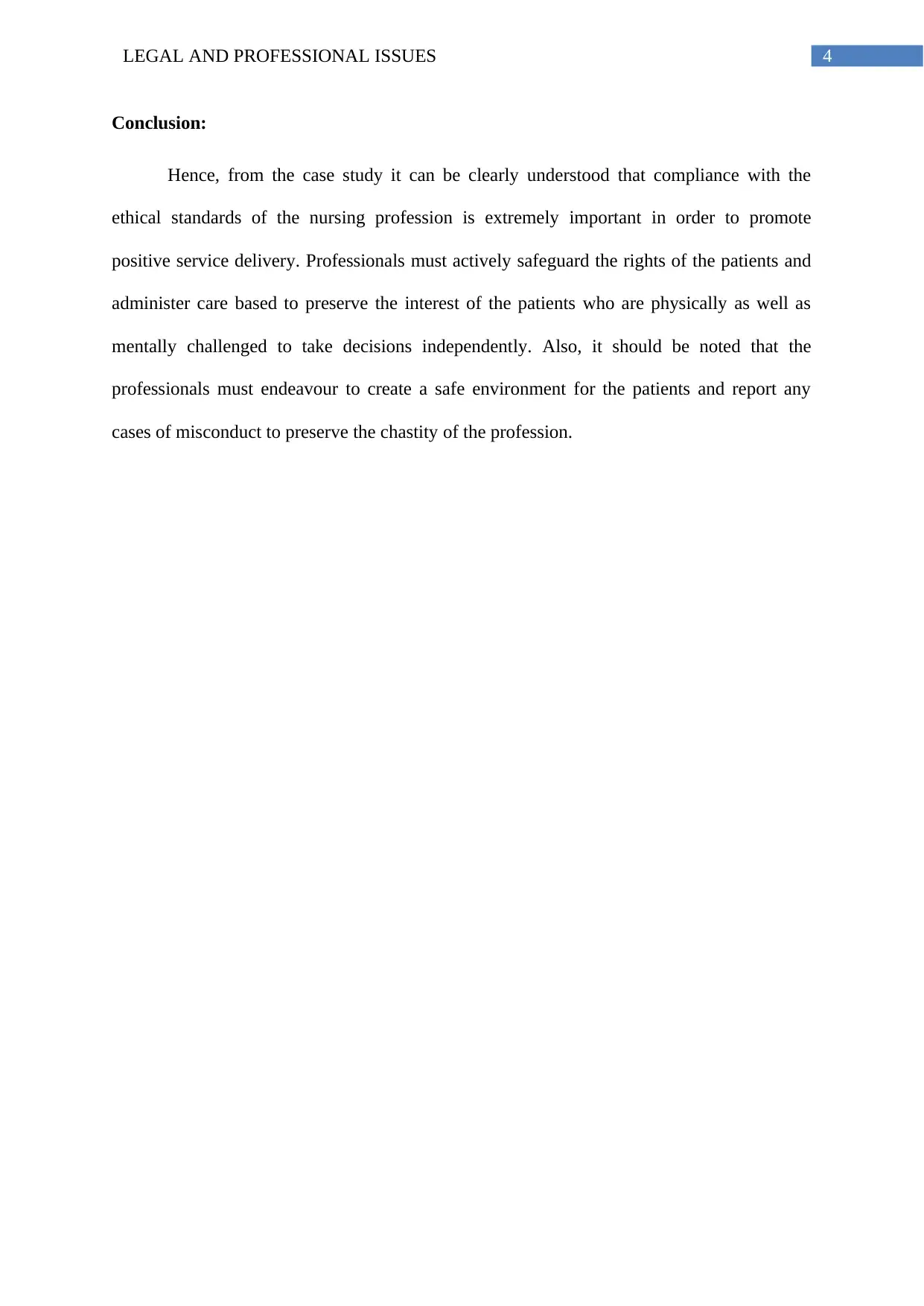
4LEGAL AND PROFESSIONAL ISSUES
Conclusion:
Hence, from the case study it can be clearly understood that compliance with the
ethical standards of the nursing profession is extremely important in order to promote
positive service delivery. Professionals must actively safeguard the rights of the patients and
administer care based to preserve the interest of the patients who are physically as well as
mentally challenged to take decisions independently. Also, it should be noted that the
professionals must endeavour to create a safe environment for the patients and report any
cases of misconduct to preserve the chastity of the profession.
Conclusion:
Hence, from the case study it can be clearly understood that compliance with the
ethical standards of the nursing profession is extremely important in order to promote
positive service delivery. Professionals must actively safeguard the rights of the patients and
administer care based to preserve the interest of the patients who are physically as well as
mentally challenged to take decisions independently. Also, it should be noted that the
professionals must endeavour to create a safe environment for the patients and report any
cases of misconduct to preserve the chastity of the profession.
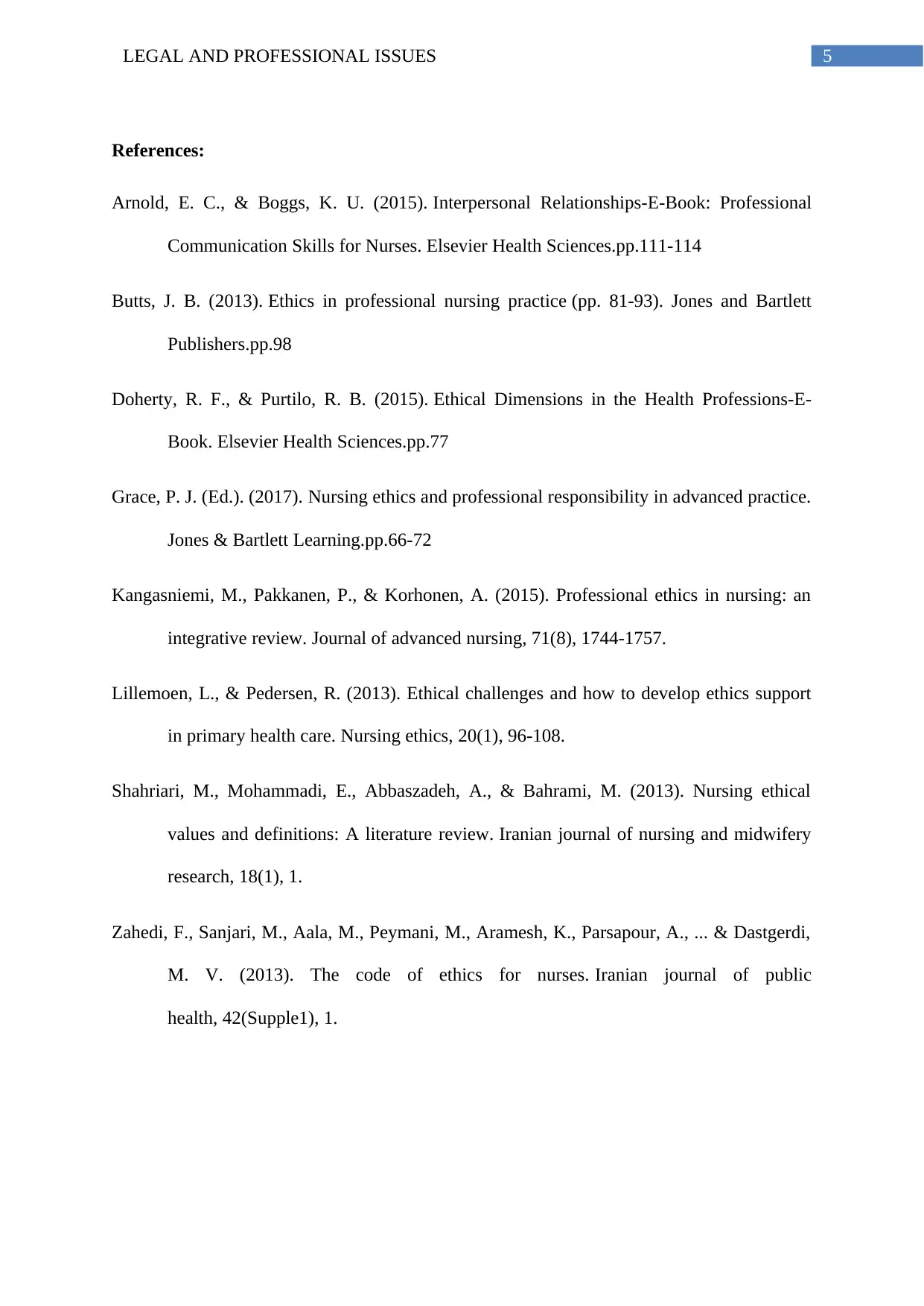
5LEGAL AND PROFESSIONAL ISSUES
References:
Arnold, E. C., & Boggs, K. U. (2015). Interpersonal Relationships-E-Book: Professional
Communication Skills for Nurses. Elsevier Health Sciences.pp.111-114
Butts, J. B. (2013). Ethics in professional nursing practice (pp. 81-93). Jones and Bartlett
Publishers.pp.98
Doherty, R. F., & Purtilo, R. B. (2015). Ethical Dimensions in the Health Professions-E-
Book. Elsevier Health Sciences.pp.77
Grace, P. J. (Ed.). (2017). Nursing ethics and professional responsibility in advanced practice.
Jones & Bartlett Learning.pp.66-72
Kangasniemi, M., Pakkanen, P., & Korhonen, A. (2015). Professional ethics in nursing: an
integrative review. Journal of advanced nursing, 71(8), 1744-1757.
Lillemoen, L., & Pedersen, R. (2013). Ethical challenges and how to develop ethics support
in primary health care. Nursing ethics, 20(1), 96-108.
Shahriari, M., Mohammadi, E., Abbaszadeh, A., & Bahrami, M. (2013). Nursing ethical
values and definitions: A literature review. Iranian journal of nursing and midwifery
research, 18(1), 1.
Zahedi, F., Sanjari, M., Aala, M., Peymani, M., Aramesh, K., Parsapour, A., ... & Dastgerdi,
M. V. (2013). The code of ethics for nurses. Iranian journal of public
health, 42(Supple1), 1.
References:
Arnold, E. C., & Boggs, K. U. (2015). Interpersonal Relationships-E-Book: Professional
Communication Skills for Nurses. Elsevier Health Sciences.pp.111-114
Butts, J. B. (2013). Ethics in professional nursing practice (pp. 81-93). Jones and Bartlett
Publishers.pp.98
Doherty, R. F., & Purtilo, R. B. (2015). Ethical Dimensions in the Health Professions-E-
Book. Elsevier Health Sciences.pp.77
Grace, P. J. (Ed.). (2017). Nursing ethics and professional responsibility in advanced practice.
Jones & Bartlett Learning.pp.66-72
Kangasniemi, M., Pakkanen, P., & Korhonen, A. (2015). Professional ethics in nursing: an
integrative review. Journal of advanced nursing, 71(8), 1744-1757.
Lillemoen, L., & Pedersen, R. (2013). Ethical challenges and how to develop ethics support
in primary health care. Nursing ethics, 20(1), 96-108.
Shahriari, M., Mohammadi, E., Abbaszadeh, A., & Bahrami, M. (2013). Nursing ethical
values and definitions: A literature review. Iranian journal of nursing and midwifery
research, 18(1), 1.
Zahedi, F., Sanjari, M., Aala, M., Peymani, M., Aramesh, K., Parsapour, A., ... & Dastgerdi,
M. V. (2013). The code of ethics for nurses. Iranian journal of public
health, 42(Supple1), 1.
⊘ This is a preview!⊘
Do you want full access?
Subscribe today to unlock all pages.

Trusted by 1+ million students worldwide
1 out of 6
Related Documents
Your All-in-One AI-Powered Toolkit for Academic Success.
+13062052269
info@desklib.com
Available 24*7 on WhatsApp / Email
![[object Object]](/_next/static/media/star-bottom.7253800d.svg)
Unlock your academic potential
Copyright © 2020–2026 A2Z Services. All Rights Reserved. Developed and managed by ZUCOL.





